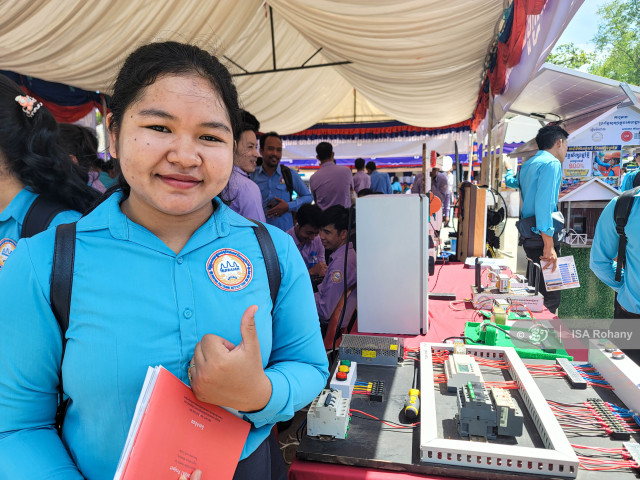Gender Does not Determine College Majors

- By Isa Rohany
- June 20, 2023 10:40 AM
SIEM REAP – Hout Sreynut is a 20-year-old sophomore majoring in electrical engineering at the Regional Polytechnic Institute Techo Sen Siem Reap (RPITSSR). Her passion for electric systems and the increasing demand for such profiles on the job market drove her major choice, despite engineering being still considered a very male-dominated profession. Sreynuth advises girls to follow their passions and says that hard work will pay off in any major.
Isa Rohany: Pursuing a degree in electrical engineering is not a common thing for women, why did you decide to study such a major?
Hout Sreynut: I chose to study electrical engineering because it tends to be easy to find a job in that field as Cambodia is a developing country with a high demand for technical skills. Every woman is welcome to study and become an engineer.
Isa Rohany: As not many women pursue engineering studies, was it easy for you to pick up that major, or did you have to do some research before being sure of your choice?
Hout Sreynut: I love [engineering topics] and that major. If men can study it, so do women.
Isa Rohany: Do your parents support you in your higher education choice?
Hout Sreynut: Yes, they do. They know that major is good for me and they also share the belief that not only men can study engineering topics. Picking up a technical major can also help women become stronger.
Isa Rohany: How many female students study electrical engineering at your school?
Hout Sreynut: The number of female students is increasing every year. The first women to engage in it did so around 10 years ago. I am in the 10th generation of female students in the institute.
Isa Rohany: After studying for two years, how do you feel about the major? Is it hard or accessible to anyone as, in the past, people said only male students could study it?
Hout Sreynut: Each major is challenging, no doubt. But if we put our hearts into learning and genuinely try to learn, it will help train us gradually and make it easier for us to study.
Isa Rohany: What do you want to be in the future?
Hout Sreynut: If I don’t want to work for others, I can run my own business. But if I don’t mind being under the leadership of someone else, I can work as a government official, or apply to be a teacher, which provides many job opportunities.
Isa Rohany: Does that field provide lots of opportunities in Siem Reap, or elsewhere?
Hout Sreynut: Yes, the job market is expanding everywhere in Cambodia. After graduation and a final internship, we can easily find a job.
Isa Rohany: Being involved in technical and industrial studies, do you find yourself different from other girls, who mostly pursue higher education that will lead them to work in the service sector?
Hout Sreynut: I think so, but I do what I love. For example, if I love electricity but end up studying air conditioning, it will be difficult to learn and feel motivated. We study what we love, but if we were forced to study what we don’t love, the result would not be good, no matter how hard we try.
Isa Rohany: Do you have a message for girls who want to study electrical engineering?
Hout Sreynut: I encourage all female students to be brave in their studies. Every major is good as nowadays people value graduate studies. If students don’t find a job after finishing high school, while they didn’t want to engage in higher education, people will look down on them. But if we study to find a job, that would be great, even though it often means having a part-time job at the same time.
Originally written in Khmer for ThmeyThmey, this story was translated by Te Chhaysinh for Cambodianess.















